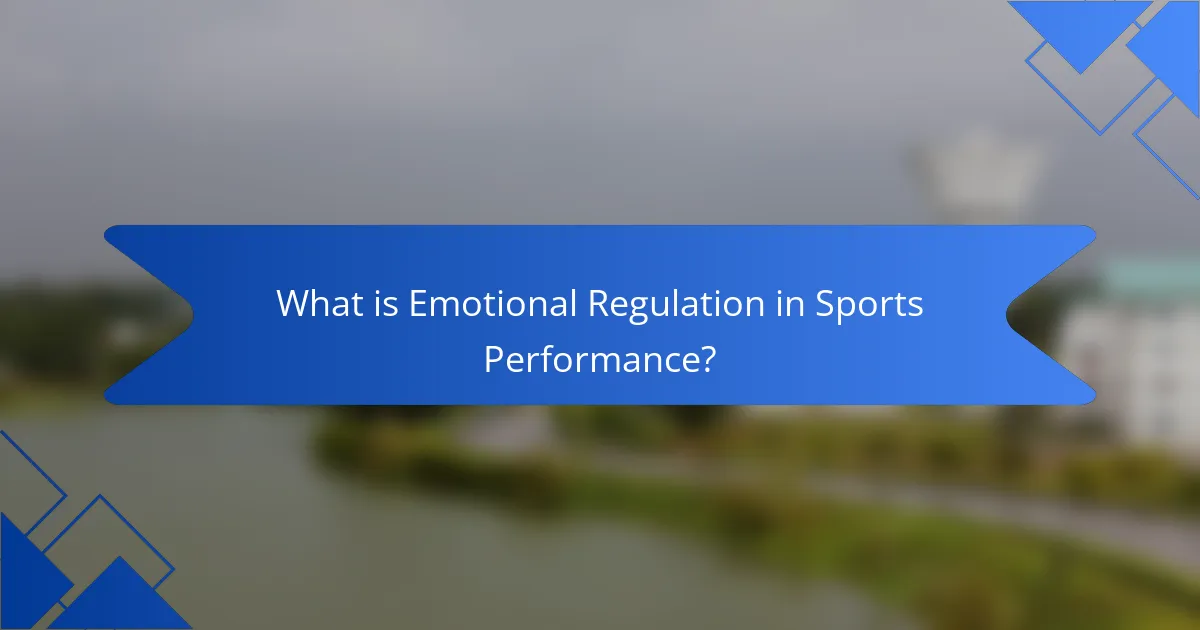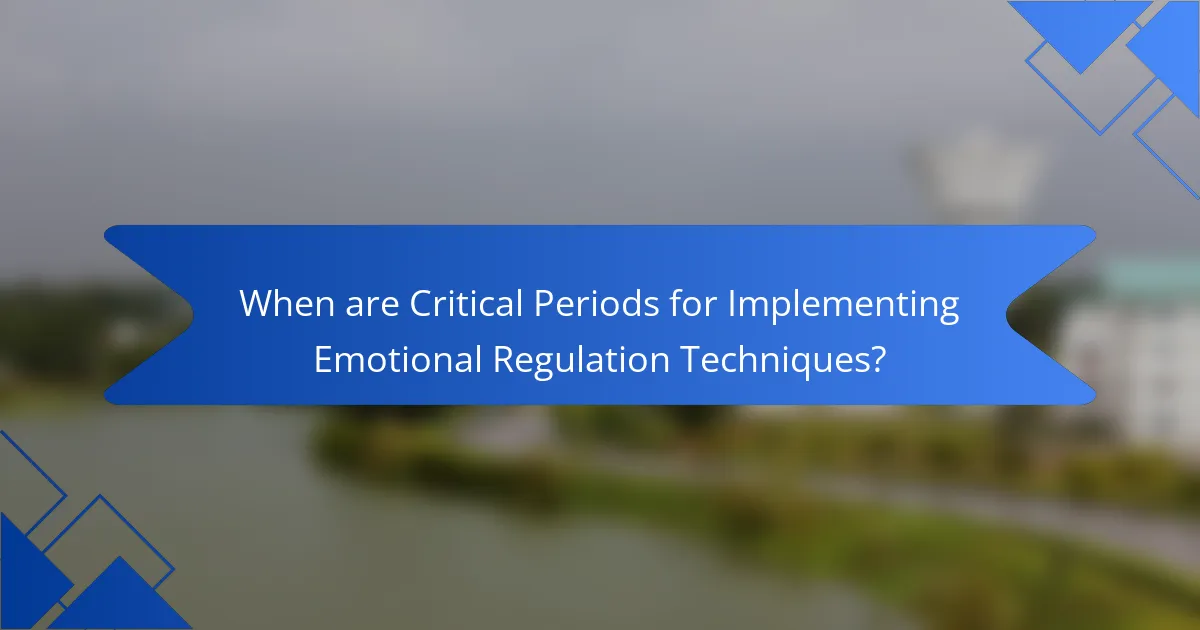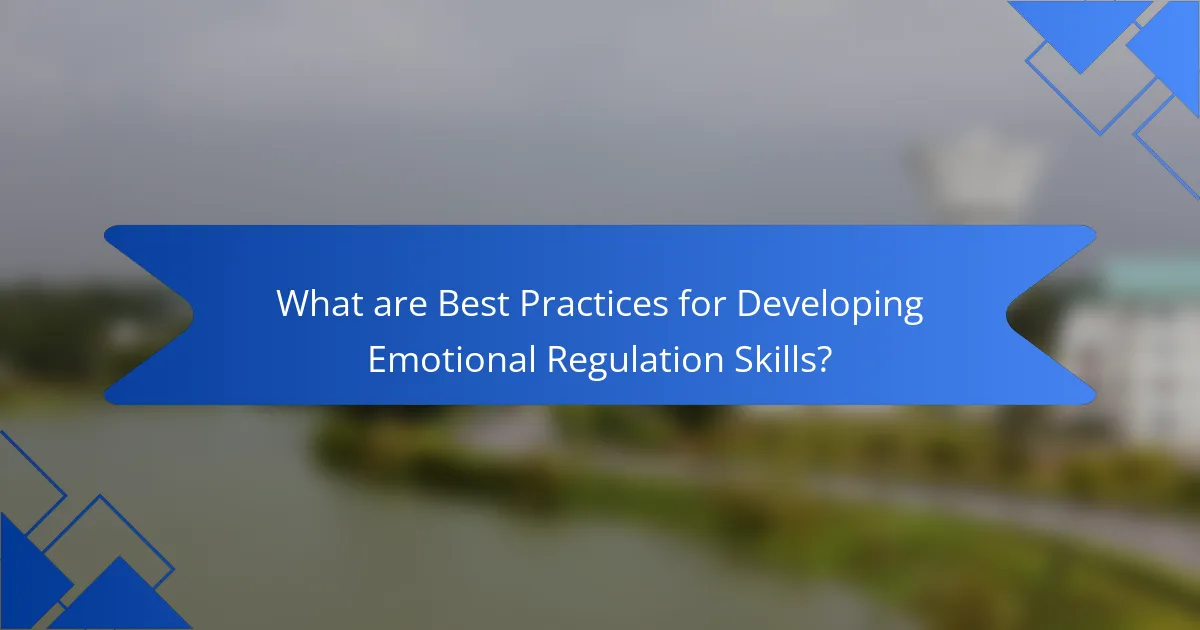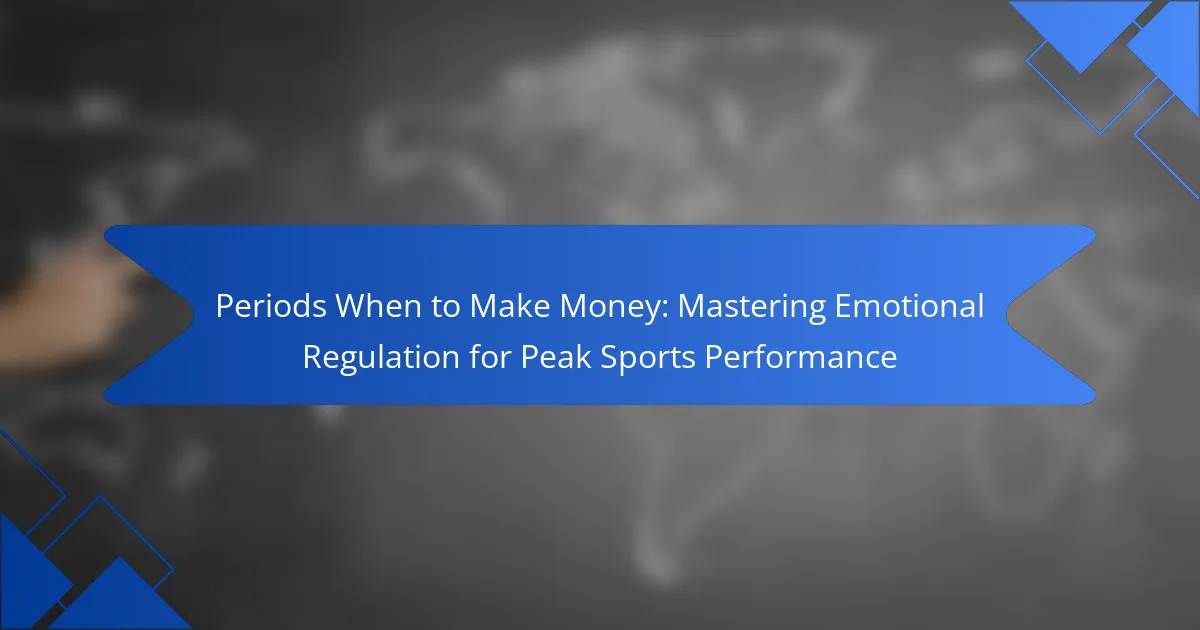Mastering emotional regulation is essential for athletes aiming to enhance their performance. This article explores the importance of emotional control, effective techniques for managing emotions, and critical periods for implementing these strategies. Key attributes such as resilience and self-awareness will be discussed, alongside actionable methods like mindfulness and visualization. Understanding these elements can lead to improved focus and better outcomes in competitive sports.

What is Emotional Regulation in Sports Performance?
Emotional regulation is crucial for optimizing sports performance. It involves managing emotions to enhance focus and resilience during competition. Athletes who master emotional regulation can maintain composure under pressure, leading to better decision-making and improved performance outcomes. Techniques such as mindfulness and cognitive restructuring help athletes control their emotional responses, thereby maximizing their potential in high-stakes situations.
How does Emotional Regulation impact athlete performance?
Emotional regulation significantly enhances athlete performance by improving focus and resilience. Athletes who master emotional regulation can maintain composure under pressure, leading to better decision-making and execution during competitions. Studies show that emotional regulation correlates with increased motivation and reduced anxiety, which are crucial for peak performance. Moreover, athletes with strong emotional control often demonstrate superior teamwork and communication skills, further amplifying their effectiveness in team sports.
What are common emotional challenges faced by athletes?
Athletes commonly face emotional challenges such as anxiety, pressure to perform, and fear of failure. These issues can hinder peak sports performance. Emotional regulation is essential for overcoming these challenges and achieving success. Athletes often experience stress during competitions, which can lead to decreased focus and motivation. Developing coping strategies, like mindfulness and visualization, can enhance emotional resilience.

What are the Universal Benefits of Emotional Regulation?
Emotional regulation enhances sports performance by improving focus, resilience, and decision-making. Athletes who master this skill experience reduced anxiety, leading to better outcomes in high-pressure situations. Effective emotional regulation fosters a positive mindset, enabling athletes to maintain motivation and adapt to challenges. Studies show that athletes with strong emotional control achieve higher levels of success and satisfaction in their sports careers.
How does Emotional Regulation enhance focus and concentration?
Emotional regulation significantly enhances focus and concentration by managing stress and emotions. Improved emotional control enables athletes to maintain clarity during competition, minimizing distractions. This skill also fosters resilience, allowing for quicker recovery from setbacks. Consequently, athletes can sustain peak performance levels, maximizing their potential to succeed.
What role does Emotional Regulation play in stress management?
Emotional regulation is crucial for effective stress management in sports performance. It allows athletes to maintain focus, control anxiety, and enhance resilience during competition. By mastering emotional regulation techniques, athletes can optimize their mental state, leading to improved performance outcomes. Strategies such as mindfulness, cognitive restructuring, and breathing exercises can significantly reduce stress levels, enabling athletes to perform at their peak. Research indicates that athletes with strong emotional regulation skills experience lower stress and higher satisfaction in their sport.
How can Emotional Regulation improve teamwork and collaboration?
Emotional regulation enhances teamwork and collaboration by fostering trust and effective communication. When team members manage their emotions, they contribute to a positive environment, reducing conflict and increasing productivity. This regulation allows individuals to remain focused and composed under pressure, leading to better decision-making and problem-solving. As a result, teams can achieve their goals more efficiently and cohesively.

What Unique Strategies Exist for Mastering Emotional Regulation?
Mastering emotional regulation involves unique strategies that enhance performance in sports. Techniques such as mindfulness training, cognitive restructuring, and visualization improve focus and emotional control during competition. Mindfulness helps athletes stay present, reducing anxiety. Cognitive restructuring allows for reframing negative thoughts, fostering a positive mindset. Visualization techniques prepare athletes mentally for various scenarios, enhancing confidence. Incorporating these strategies can significantly impact peak performance.
What techniques do elite athletes use for emotional control?
Elite athletes use techniques like mindfulness, visualization, and breathing exercises for emotional control. These strategies enhance focus, reduce anxiety, and improve performance under pressure. Mindfulness helps athletes stay present, while visualization allows them to mentally rehearse successful outcomes. Breathing exercises regulate physiological responses, promoting calmness during competition.
How can visualization and mental rehearsal aid in emotional regulation?
Visualization and mental rehearsal enhance emotional regulation by promoting focus and reducing anxiety. These techniques allow athletes to mentally simulate performance scenarios, fostering confidence and control. Research indicates that visualization can lead to improved emotional resilience during competition. Regular practice strengthens neural pathways, making emotional responses more manageable.

What Rare Attributes Influence Emotional Regulation in Sports?
Rare attributes that influence emotional regulation in sports include resilience, self-awareness, and adaptability. Resilience allows athletes to recover from setbacks quickly, enhancing their overall performance. Self-awareness helps athletes recognize their emotional triggers, enabling better control during competition. Adaptability facilitates quick adjustments to changing situations, maintaining focus and composure. Together, these attributes create a robust framework for managing emotions effectively, leading to peak performance.
How do cultural factors affect emotional expression in athletes?
Cultural factors significantly influence emotional expression in athletes, affecting their performance. Different cultures have varying norms regarding emotional display, impacting how athletes manage stress and pressure. For instance, athletes from collectivist cultures may prioritize group harmony, leading to subdued emotional responses. Conversely, those from individualistic cultures might express emotions more openly, enhancing personal motivation. Understanding these cultural nuances can facilitate better emotional regulation strategies tailored to specific athlete backgrounds, ultimately boosting sports performance.
What are the effects of coaching styles on athletes’ emotional regulation?
Coaching styles significantly influence athletes’ emotional regulation, impacting their performance. Authoritative coaching fosters confidence and resilience, while permissive styles may lead to anxiety. Research indicates that structured feedback enhances emotional stability, promoting better focus and motivation. Tailoring coaching approaches to individual athlete needs can optimize emotional responses, ultimately improving peak performance.

When are Critical Periods for Implementing Emotional Regulation Techniques?
The critical periods for implementing emotional regulation techniques in sports performance occur during pre-competition, in-competition, and post-competition phases. During these times, athletes can optimize their emotional responses to enhance focus and resilience. Research indicates that emotional regulation is most effective when practiced consistently, particularly in high-pressure situations. For example, techniques such as mindfulness and visualization should be integrated into training routines to prepare athletes for competition.
What role do pre-competition routines play in emotional regulation?
Pre-competition routines significantly enhance emotional regulation by fostering focus and reducing anxiety. These routines create a structured environment that promotes confidence and mental clarity. Athletes who engage in consistent pre-competition rituals report improved performance and emotional stability. Research indicates that such practices can lead to a 25% decrease in pre-competition anxiety levels, allowing for optimal sports performance.
How can emotional regulation be adapted during high-pressure situations?
Emotional regulation during high-pressure situations can be enhanced through specific strategies. Practicing mindfulness allows athletes to maintain focus and reduce anxiety. Developing pre-performance routines creates a sense of control, promoting confidence. Visualization techniques help athletes mentally prepare for challenges, fostering resilience. Finally, breathing exercises can stabilize emotions, enabling clearer decision-making under stress.

What are Best Practices for Developing Emotional Regulation Skills?
To develop emotional regulation skills for peak sports performance, practice mindfulness, self-awareness, and coping strategies. These methods enhance focus and resilience during competition. Regularly assess emotions and responses to stressors, fostering a proactive approach to emotional challenges. Engage in visualization techniques to prepare mentally for high-pressure situations. Establish routines that promote calmness and clarity, ensuring athletes respond rather than react under pressure.
What common mistakes do athletes make in emotional regulation?
Athletes often struggle with emotional regulation, leading to performance issues. Common mistakes include ignoring emotions, overreacting to setbacks, and failing to use coping strategies. These errors can hinder focus and decision-making during competition. Recognizing triggers and developing a consistent emotional management plan can enhance performance.
How can coaches support athletes in mastering emotional regulation?
Coaches can support athletes by implementing structured emotional regulation techniques. These techniques include mindfulness practices, cognitive-behavioral strategies, and emotional awareness training. For example, teaching athletes to identify triggers and manage stress through breathing exercises enhances focus and performance. Additionally, fostering a supportive environment encourages open communication about emotions, promoting resilience. Regular feedback and goal-setting can also help athletes track their emotional progress, ensuring they remain engaged and motivated.
What immediate steps can athletes take to improve emotional regulation?
Athletes can improve emotional regulation by practicing mindfulness, setting clear goals, and utilizing breathing techniques. These steps enhance focus and resilience during competition. Mindfulness helps athletes stay present, reducing anxiety. Goal setting provides direction, while controlled breathing techniques can calm nerves. Engaging in regular mental training exercises can also foster emotional stability.


